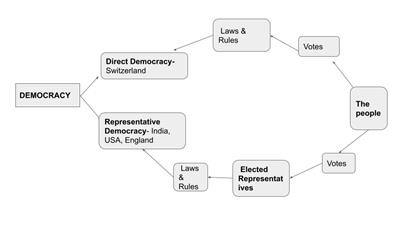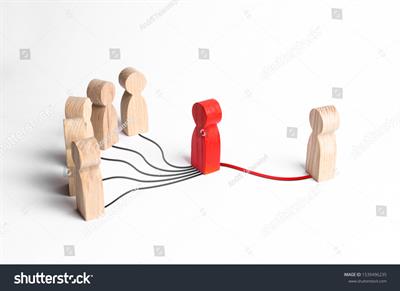
PUMPA - SMART LEARNING
எங்கள் ஆசிரியர்களுடன் 1-ஆன்-1 ஆலோசனை நேரத்தைப் பெறுங்கள். டாப்பர் ஆவதற்கு நாங்கள் பயிற்சி அளிப்போம்
Book Free DemoWhen people suffered from the rigid authoritarian rule of a monarchial head, they demanded democratic rule. So it increased the struggle against the single-head rule, which paved the way for Democracy. Democracy evolved through popular struggles and movements.
Democracy:
The birthplace of democracy is Greece.
Democracy is a term derived from two the Greek words "Demos" and cratia". 'Demos' means the people and 'Cratia' means power or rule.
In a Democratic country, its citizens select their representatives through elections. Citizens take part in the direct governance of a country. A considerable amount of power lies with the people of that nation. People can participate in the politics of the country and decision making processes.
Democracy is ‘Government of the people, by the people, for the people’ – Abraham Lincoln
Forms of democracy:
There are various types of
democracy in practice around the world. But no two systems of democracy are similar.
Among those, direct democracy and representative democracy (or) Indirect democracy are the most popular forms of government.

Types of democracy
Direct Democracy:
In a direct democracy, only the citizens can make laws. All changes have to be approved by the citizens. The politicians only rule over parliamentary procedure. Direct participation of citizens is essential in this method.

Voting
Switzerland has had a long history of a successful direct democracy.
Indirect democracy (or) Representative Democracy:
All the members should be represented by a group of representatives. Those group members will administer the country on behalf of all the other members.
To select these representatives, elections are held. Who gains the maximum number of votes will be given to the posts. On behalf of the other members, they obtain the power to take decisions democratically.

Representation of People
Types of representative democracy:
1. Parliamentary Democracy - In a parliamentary system, the leader of the government is not elected by the voters. Instead, voters elect members of parliament. Example: India, England.
2. Presidential Democracy - In this form of democracy, the executive, legislativeand judiciary are separated. And the President is elected by the people. He is also not a member of the legislature. Example: USA, Canada.
Democratic decision making:
The power to make decisions does not lie with the Head. On the contrary, a group holds the power but adheres to the rules and regulations.
All the members of the group hold open discussions and take final decisions only when everyone is convinced. This is called the democratic way of decision-making.